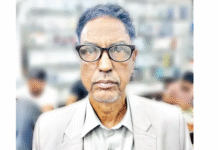The opportunity will come soon. The BNP must be prepared – not only to win the election, but to take this nation to greater heights

- Is she tired of all the advice?
BNP chairperson Khaleda Zia and her colleagues must be fed up with the whole “knowledge donation” campaign going on for them. Newspaper articles, editorials, post-editorials, commentaries, talk shows, civil society-led seminars and meetings – all are telling them what went wrong, what the BNP should have done, what they could have avoided.
While most of these discussions feel that BNP was history in Bangladesh, a few still believe that after some cleaning up, planning, and an inclusive election, the BNP has a fair chance of coming back.
This is Bangladesh. We are seeing many meant-to-be civil society members, economists, journalists, and teachers who are quite vocal about a participatory election, and hopeful about the BNP’s comeback. Even individuals who reportedly tried to woo India for the BNP and expected to find a place in Khaleda Zia’s nation-building plan are fast to shift.
I met a few young BNP hardcores the other day. They still felt that some of their senior leaders betrayed the chairperson, and that their senior vice chairman was not in touch with the right people in the party and was failing to show leadership. They felt the chairperson herself was averse to risk.
A few of them felt that BNP had outsourced too much to Jamaat for the anti-government movement. More importantly, they still felt that it was India who gave all the incentive and support for the Awami League to hold a barely-participatory election and stay in power.
They are confident that India has to bow down to a devastating movement launched by Bangladeshis, and come to terms with Bangladesh, especially its nationalist force. How will this movement be organised? They didn’t have a definitive answer. They said the chairperson thought something would come out, that the AL itself would create an opportunity through their misrule and indifference towards democracy and rule of law.
I still feel that the BNP didn’t lose out because of the campaign against war criminals and the violence committed by Jamaat. It was more due to the AL being able to use the media, utilise the police administration, and the election commission in its favour. More importantly, the civil society remained almost indifferent.
Civil society in Bangladesh is losing energy. Old citizens are getting older, and younger ones don’t have the conviction. I can bet we won’t see another Justice Habibur Rahman, Rehman Sobhan, Sir Fazle Hasan Abed, Professor Yunus, Akbar Ali Khan, Abdullah Abu Sayeed, or Sultana Kamal emerging soon. The leading political parties know full well how to win or marginalise these emerging and vocal civil society entrants.
The rise of the middle class, the creation of increasing numbers of wealthy pockets within the parties, the large beneficiaries of misrule – none are helping to forge a strong anti-government agitation. There is too much money in too many hands. Saying yes to the “good life” is working as a barrier to launching strong agitation movements that would force the government to reverse their tracks, no matter who says what.
There is an increasingly hostile India, an unsure US, and a gain-oriented China. Global powers can no longer dictate the terms for national governments.
The BNP has to be on its own, doing all the right jobs, holding party council meetings, reorganising the party, inducting new blood into party leadership, staying away from Jamaat and gradually reducing dependence on them, and creating synergy with a broader spectrum of citizenry. It desperately needs to strengthen its relationship with Indian citizens, media, and opposition parties. This must happen soon.
I strongly feel that with an engulfing India, the AL becoming almost a one-party ruler, and pervasive corruption, the opportunity will come soon. The BNP must be prepared this time – not only to win the election, but to take this nation to greater heights of success, with clear visibility about the destination.
We need democracy to flourish, the economy to prosper, for courts to champion the causes of the marginalised, for the youth to find encouragement, and most importantly, for Bangladesh to find a respectable position among other nations. The number of well-wishers of Bangladesh is increasing. Many want us to succeed. The world cannot afford a failing Bangladesh.
Source: Dhaka Tribune









